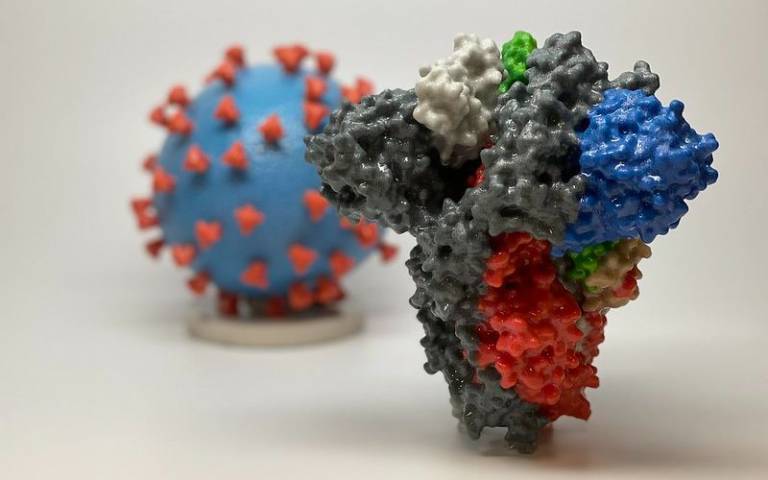Threats of new SARS-CoV-2 variants focus of UK-wide study
15 January 2021
Scientists at UCL will play a key role in helping understand the effects of emerging mutations in SARS-CoV-2, the virus that causes COVID-19, as part of a new national research project.

The ‘G2P-UK’ National Virology Consortium’*, launched with £2.5m funding from UK Research and Innovation (UKRI), brings together leading virologists from 10 research institutions.
Mutations in the virus’s genome occur naturally; some of these will be inconsequential, others will increase the spread and risk of harm. The Consortium aims to find out how and why these variants differ, specifically: how transmissible they are, the severity of COVID-19 they cause and the effectiveness of vaccines and treatments against them.
A UCL team, led by Professor Greg Towers (UCL Infection & Immunity), will study how mutations in SARS-CoV-2 influence its ability to escape our natural immune defenses to cause disease. The team has already shown that the inflammation caused by infection of lung cells is due to detection of the viral RNA by defensive systems with the infected cells**.
Measuring whether the new SARS-CoV-2 variants cause different immune responses in infected cells will inform whether they are likely to drive more serious disease or change in their transmissibility.
Professor Towers said: “At the start of the pandemic we decided that the best way we could contribute was to get set up and grow the virus and investigate how it interacts with the innate immune system and causes disease. We’ve worked really hard on that since April and have just published our first paper** which shows that the inflammation caused by infection of lung cells is due detection of the viral RNA by cellular defensive systems.
“We’re delighted to be part of the G2P-UK consortium and are really well positioned to deploy our new expertise to investigate the basic science of new SARS-CoV-2 variants. Our work will provide key data that will help the G2P-UK consortium inform public health decision making. It is fantastic to be part of such a collaborative network of expertise.”
The new national G2P-UK project will work alongside the COVID-19 Genomics UK (COG-UK) consortium, which plays a world-leading role in virus genome sequencing, and Public Health England to boost the UK’s capacity to study newly identified virus variants and rapidly inform government policy.
Viral mutations always occur. The question is whether mutations in SARS-CoV-2 change behavior. It is particularly important to know if the new variants reduce sensitivity to the vaccine or antiviral drugs. Now we know how to make a vaccine, any changes required can be made quickly so it’s critical to understand if this is happening.
Dr Lucy Thorne (UCL Infection & Immunity) said: “Since April, we’ve learned how to grow the virus in our high containment labs and have set up ways to measure how efficiently SARS-CoV-2 infects cells and how the cells respond. We have already started working on the new UK variant and we’re ready to investigate other new virus variants as they arise.”
Virologist, Dr Clare Jolly (UCL Infection & Immunity), added: “This consortium is an exciting development, allowing us to combine forces with virologists across the UK to better understand and fight the SARS-CoV-2 pandemic.”
As new virus variants arise, the consortium will decide which variants to study and then distribute the necessary material between the collaborating laboratories, generate all the molecular tools required to perform this work and distribute them to the centres of research.
They will then examine whether SARS-CoV-2 is mutating to become more easily transmissable or less sensitive to antiviral drugs.
Professor Emma Morris, Director of the UCL Infection & Immunity, said: "Basic virology research at the very highest level has a hugely important role to play in understanding and managing the pandemic. The Towers lab has a fantastic reputation for its work on how viruses interact with innate immunity and I can’t think of anyone better to run this important work for the G2P consortium. I’m thrilled that our virologists are playing such an important part in the UK COVID response.”
By setting up a coordinated programme across the UK, to study the latest virus mutations simultaneously in several labs with complimentary experimental methods, the researchers aim to produce faster, reliable results to feed into public health policy and clinical practice.
*The 10 research institutions involved are: UCL, Imperial College London, The Francis Crick Institute, The Pirbright Institute, King’s College London, University of Glasgow, University of Bristol, University of Liverpool, University of Oxford and University of Cambridge. The researchers will work alongside the COVID-19 Genomics UK (COG-UK) consortium and Public Health England.
** Research paper published on bioRxiv
Links
Image
- ‘Novel Coronavirus SARS-CoV-2 Spike Protein’, Credit NIH Image Gallery on Flickr CC BY 2.0
Media contact
Henry Killworth
Tel: +44 (0) 7881 833 274
E: h.kiilworth [at] ac.uk
 Close
Close

